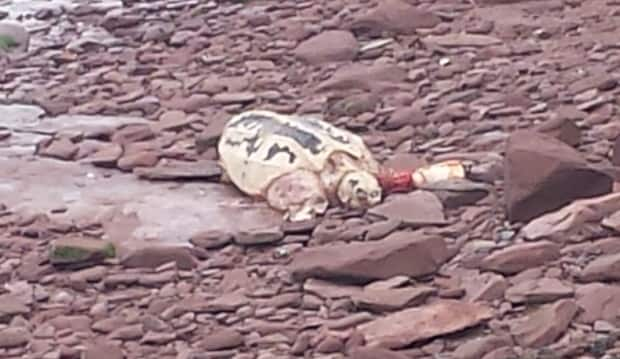A massive, rare sea turtle washed up on P.E.I. It was likely on its way to be with family

A large and increasingly rare type of sea turtle washed up on P.E.I.'s shores last Friday.
A dead leatherback sea turtle was confirmed to have been discovered in the community of Fernwood on May 19, the Department of Fisheries and Oceans said in an email to CBC News.
The DFO responded to some local residents' call about the turtle, with help from the Halifax-based Canadian Sea Turtle Network.
Leatherback sea turtles are the world's largest living turtles. The species faces world-wide population decline, and is considered to be endangered in Canada.
Kathleen Martin, executive director of the Canadian Sea Turtle Network, said the turtles are known to enter Canadian waters this time of year to feed on jellyfish.
Then, they head south and instinctively return to the same beaches where they hatched to nest – a behaviour called "natal homing."

"So you end up with these beaches full of, like, sisters and aunts and mothers and cousins," Martin said.
But the discovered turtle didn't have a chance to meet its family.
It's likely the animal died last year from being entangled in fishing gear and it's just now being found, Martin said.
Tom Sherry was one of the Fernwood residents who discovered the turtle. When he got there, he couldn't believe his eyes.
"It was quite a sight," he said.
"It was kind of sad to see that it was in the water there and had been deceased possibly for a little while."
'Badly decomposed'
Two fishery officers from the Alberton Conservation and Protection detachment responded to the sighting, DFO said.
This is not the first time a leatherback sea turtle washed up P.E.I.'s shore. Those that were found before would typically be transported to the Atlantic Veterinary College for a necropsy.
But in this case, the turtle was "too badly decomposed" for wildlife pathologists to perform any kind of procedure, the AVC said in an email.

Martin said what's left of the turtle is falling apart, so it's difficult to measure it accurately. A leatherback sea turtle can reach up to two metres long and weigh more than 450 kilograms, she said.
The species has been around for more than 150 million years, back to when dinosaurs walked the planet. Today, they're declining at a rate of almost 8 per cent a year, Martin said.
"They're in serious decline."
'We're like the UN of sea turtles up here'

In Canada, they are protected under the Species at Risk Act. Martin said leatherback sea turtles from all over Central and South America have been identified in Canadian waters where they "really bulk up and eat" before heading home.
"We're like the UN of sea turtles up here, where everybody comes and hangs out," Martin said.
"It's really important that we keep them safe here … and that we do all the work we can to learn about them."
That's why it's important the DFO, the Canadian Sea Turtle Network, the AVC as well as Nova Scotia's Marine Animal Response Society all have a hand in the process of responding to any specimens found in Atlantic Canada, she said.
At the moment, the turtle — or what's left of it — is still there in Fernwood.
DFO officers had pulled it to shore and removed the fishing gear that killed the animal. The gear will likely be returned to whoever lost it, Martin said.
"Typically what you do is, at this point, let nature take its course," Martin said. "There will be things that scavenge off of that turtle and all the rest of it."
Martin said the decomposing body doesn't pose any threat to people.
She encourages people to call the Canadian Sea Turtle Network if they see anything to do with sea turtles because that can help wildlife officials bring the animals in and collect information that can help with conservation efforts.
"That's really an act of what we call citizen science," Martin said.
"That's what we need in the world right now."


